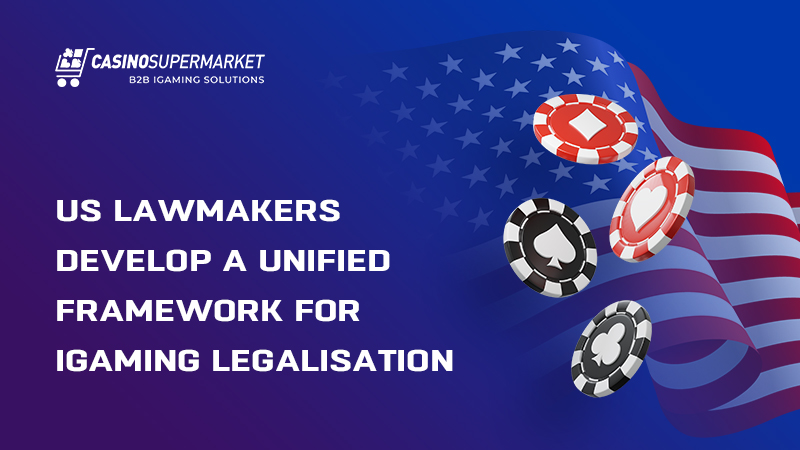
The NCLGS has announced a new phase in the development of legal provisions for officialising the iGaming industry.

The project was initiated to prepare lawmakers to adopt standardised norms regarding the entertainment segment. As a result of this work, any state will be able to use a ready-made framework to launch local online gambling markets in 2025 or later.
Fundamental Objectives and Provisions
The project has been in development for several months. A discussion united all interested parties, including several regional regulators.
The stakeholders highlighted several key points that should become an essential metric. For instance, the bill’s current version prescribes a 15−25% floating tax rate. This figure is consistent with the average deduction of 19% in 7 legal states.
The new framework will include regulations on several aspects, such as:
- rules for placing advertisements;
- licensing standards for niche enterprises;
- approved channels for generating revenue;
- guarantees for the security of data exchange;
- compliance with responsible gambling principles;
- the presence of age and other player restrictions, etc.
The draft law was planned to be officially presented by August 1, after which a public comment process must be initiated for a period of 30 days.
After the debate, authorised people will consider the propositions and revise the bill taking into account the information received. The document’s final version will be presented at the NCLGS meeting on December 12−15 in New Orleans.
Specific categories of sports betting have been legalised in about 40 states in the past 5 years. However, the iGaming business is approved only in 7 destinations across the country despite the overall positive trend and great potential of the amusement market.
The US territories with officialised online gambling comprise:
- Michigan;
- Delaware;
- New Jersey;
- Connecticut;
- West Virginia;
- Rhode Island;
- Pennsylvania.
The turnover of the digital casino segment has already exceeded the profitability of sports betting. Nevertheless, the internet gaming vertical still has a much harder time and takes longer to emerge from the shadows than any other commercial area.
The 2 sectors feature significant distinctions, including the target audience. At the same time, despite the differences in user requests, both niches have many points of contact. Taking this fact into account, the optimal solution would be to unite sportsbooks and casinos in the digital space. This decision can help operators attract a broader client base.
The final details of the document are still being worked out. Lawmakers are now cutting down the 100-page bill and breaking it down into lists of legislative and regulatory proposals. Interested parties plan to achieve maximum flexibility and the ability to quickly adapt the framework to each state’s legal realities. The final version is expected to be 15−20 pages long. Any complex or ambiguous wording will be excluded.
Learning from the Maryland Experience
This year, the local authorities made an attempt to legalise the iGaming field. The path to opening a transparent digital market lies through a profound education reform for both local legislators and the public. Any programs to expand gambling in Maryland must bring practical benefits to the voters.
Currently, the system is designed in such a way that the main regulatory issues are resolved behind closed doors. Only if all stages of discussions and debates among parliamentarians are passed, the bill is presented to the general public. Because of this exhaustive bureaucratic red tape, the attempt to approve iGaming in the state failed.
The existing procedure needs a fundamental transformation. The issue of legalisation must be treated as a standard business campaign. If there is a bill that has good prospects, there should be a support team behind this project.
Following the current legal norms, the next opportunity for Maryland’s activists to discuss the law on officialising internet gambling will appear only in 2026.
Finances as a Crucial Factor for Success

Currently, iGaming tax revenue surpasses sportsbook fees by 3−5 times depending on the state. These are rather complicated conditions for further developing the local digital casino vertical.
Interested market participants are expressing high hopes that 2025 will see significant changes in the country’s online gambling regulation.
The expectations are based on 2 factors:
- Elections. This is traditionally a non-beneficial time to push through potentially controversial issues. Additionally, when the political event ends, legislatures may see new faces around and potentially more favourable circumstances for the amusement segment’s expansion.
- Post-pandemic period. Another reason for stepping up efforts in 2025 will be the closure of financial programs aimed at helping businesses recover after COVID-19. For some states, this will mean a multiple increase in requests for financial support and investments.
Challenges and Arguments in the Industry
The sphere needs uniform and in-depth standards to function properly. Technology and gaming studios must operate under similar rules. This criterion will shape a secure, transparent and efficient business environment.
Nowadays, revenue certification norms are often ignored, but this is unacceptable in the context of successful gaming legalisation.
The entertainment industry should be ready to prevent and actively combat:
- terrorism funding;
- money laundering activities.
In this case, AML instruments are of inavital assistance. The main goal of lawmakers is to equip regulators with the right tools to make the gambling environment safe and transparent.
Another issue in the segment is exaggerated concerns about growing competition between online casinos and land-based establishments. The problem of cannibalisation first surfaced in 2010 and became a key factor in thwarting efforts to open up the digital gambling market. Stakeholders conducted a series of additional studies to get to the bottom of the issue, but they yielded controversial data.
Here are a few facts about the arguments:
- The public’s primary concern is the fear of losing jobs. However, this problem is far-fetched and completely unfounded.
- The online industry does not harm the development of ground gambling zones in any way, and research in recent years proves the point.
- The issue is overblown since the digital vertical can attract no more than 10% of land-based casinos' coverage.
For operators, the legalisation of iGaming will become an additional tool for increasing profits. The changes promise to create new industry communities and the infrastructure that requires hiring a large number of specialists. The combination of web and physical activities is another beneficial solution.
You can get additional information about the nuances of certifying gambling projects and order a turnkey entertainment business at the Casino Market studio.
To start a fruitful partnership, feel free to contact our managers in any convenient way.
Have questions or want to order services?
Contact our consultants:
- e-mail: manager@casino-market.com
- feedback form.
Check the information used to contact us carefully. It is necessary for your safety.
Fraudsters can use contacts that look like ours to scam customers. Therefore, we ask you to enter only the addresses that are indicated on our official website.
Be careful! Our team is not responsible for the activities of persons using similar contact details.








